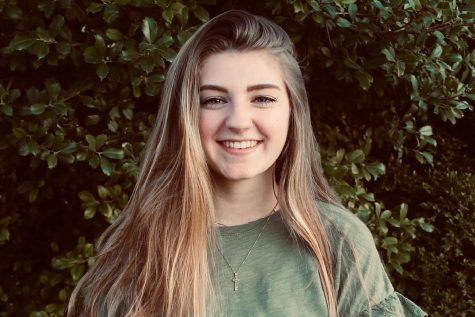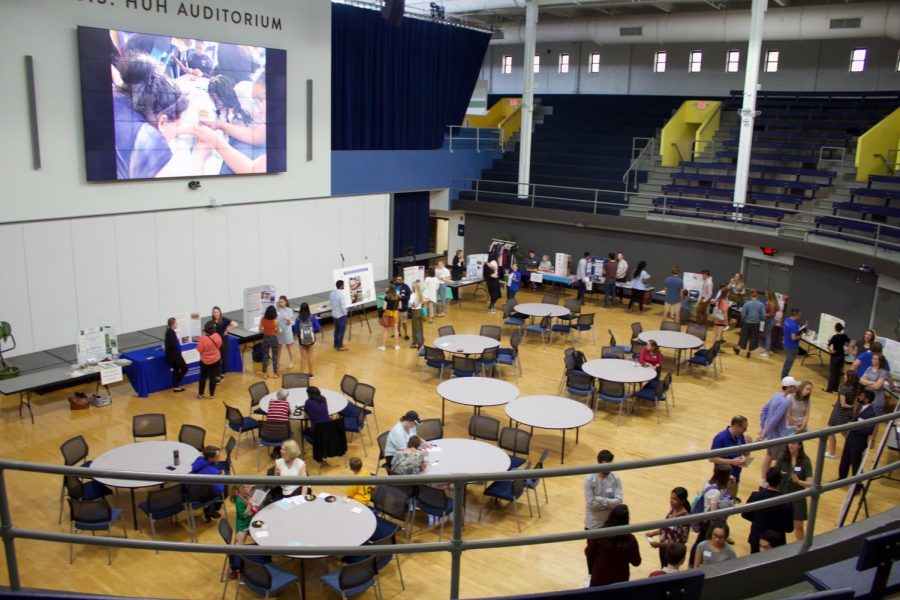Ideas Become Realities at 1818 Grant Showcase
Last year, the Center for Community Engagement and Service announced that the end of Make A Difference Day was upon us. As SLU students mourned the loss of the beloved day, the Center wasted no time beginning a new project – the 1818 Grant Program.
In honor of SLU’s bicentennial year in 2018, the Grant Program provided $1,800 grants to 18 student and faculty groups that applied in early September. Although the Center only expected 30 applications, 54 groups hoping to make a positive difference competed for the grant. The final 18 groups selected were chosen because of their “wide…but also a deep impact,” according to Bobby Wassel, assistant director for service and outreach of the Center.
On Saturday, April 6, the 18 groups chosen in October were able to showcase their projects to the SLU community. Gathered in the Center for Global Citizenship, the students and staff put up posters and embellishments to advertise for their projects. Parents, faculty and fellow students walked around the auditorium, speaking with representatives from each project that piqued their interest.
Groups showcased at the event had a broad range of goals, such as: tutoring services for underprivileged communities, supporting women of poverty in St. Louis, working to help the environment in creative ways and even helping the youth in troubled areas through dance.
Abu Sari is one grant winner who chose to use the funds to move his preexisting project to another level. Sari works with Project Downton St. Louis, a program that usually serves meals to the homeless, which used their grant money to purchase feminine products for low-income St. Louis women. When Sari and his team asked their community what they needed most, the answer was overwhelmingly clean menstrual products to use for their cycle every month.
As many SLU students have decided to volunteer with the Project, Sari stated that “it really opened up the eyes of a lot of the students to realize that there is more that needs to be done in the community than just coming here, waking up, going to class and going home.”
Freshman Ashlyn Southard found the same results. Southard created the Sibling Support Network, which provides local schools with kits to implement support groups for students who have siblings with disabilities – a group that often also struggles with mental illness.
Although Southard agrees with Sari, she believes that the effect goes beyond students. Southard believes that the Grant also “empowered the kids that I am working with” and that the impact is “very widespread, not just to the students who receive the grant money but also to the people they’re affecting.”
Similar to both projects, Queer Closet is an organization started last year that focuses on another underserved community. Sophomore Grayson Chamberlain, president of the Queer Closet program, began the project out of his freshman year dorm. While he had the original intention of helping to dress boys going on dates, the present-day Closet has evolved immensely.
Chamberlain stated that the project’s entire incentive changed when someone came to him and said, “Hey, I think I’m questioning my gender identity, can I borrow some clothes?” After that, the Closet’s primary goal became providing queer people with the necessary resources to discover their identity.
Partnering with PrideStl, Queer Closet used their funds to purchase clothes that are stored in the Rainbow Office of the BSC. Any student can come check out clothes for a semester-long fee of $4.
Chamberlain and his team decided on this small fee because “transitioning is extremely expensive and also college is extremely expensive” and that the most important factor of this project for him was to “help specifically my trans brothers and sisters try to be a little bit more comfortable with themselves.”
Wassel believes that Queer Closet is one example from the grant winners that perfectly exemplifies what he and his team created the project for. “Students saw a real need on our campus community for students that feel in the margins,” he said.
“It’s neat to see students take something and run with it,” Wassel said about Queer Closet. “But that one feels close to home because it’s helping SLU students who are queer or transgender, maybe they can come across feeling more connected to the University in some way.”
Ultimately, the people at the showcase were able to experience the passion and creativity that the SLU community possesses. According to Wassel, his goal for the day was to have students “leave here knowledgeable about all the cool things these students are doing and also inspired to submit an application for next year.”
However, the foremost hope for the entirety of the 1818 Grant Program is that it will have a lasting, positive impact on the community and students– a feeling shared by Wassel and the 18 groups showcased.
Your donation will support the student journalists of Saint Louis University.





